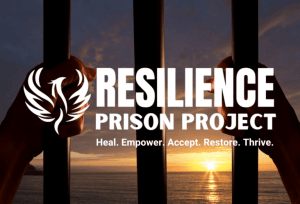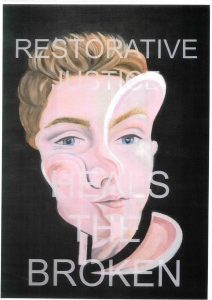After 25 years of experiencing the criminal justice system as an incarcerated person inside the Oklahoma Department of Corrections, I have witnessed first hand how the concept of rehabilitation has often been overshadowed by punitive systems. However, along the way I have also discovered some game changers like Nonviolent Communication (NVC), restorative justice, mindfulness, and trauma informed training programs that have emerged as beacons of hope for people like me. They offer a profound and transformative learning experience. In what follows, I share the immense benefit of how much an integrated framework is transforming lives behind bars. Additionally, they can positively impact incarcerated individuals and the larger communities many of us return to.
What is Transformative Learning?
Transformative Learning, according to Jack Mezirow, is about experiencing a significant change in the way you see and understand things. It involves ten steps or phases that help guide you through a deep rethinking of your beliefs and how you view yourself and the world. It’s like a journey that reshapes your perspective on life.
The Ten Phases Outlined
Working Our Way In: One thru Five
Phase 1: A Disorienting Dilemma
Step one of transformative learning involves encountering a disorienting dilemma, i.e. a crisis, which challenges an individual’s existing beliefs and perceptions. For people like me, this dilemma is often the stark reality of incarceration itself or a significant event occuring after being sent to prison. NVC programs introduce a fresh perspective at such a pivotal moment, challenging one’s values and ultimately one’s core beliefs, setting the stage for transformative growth.
Phase 2: Self-examination
Next, incarcerated individuals who have had the scales removed from their eyes, so to speak, engage in an introspective journey. Such programs encourage one to reflect on past actions. This promotes self-awareness and a recognition of the harm caused to others and oneself. Within the Resilience Prison Project participants spend 12 weeks undergoing crime sharing and mock parole hearings following 24 weeks of learning NVC fundamentals. This self-reflection is an important step toward transforming lives behind bars and restoring justice.
Phase 3: Critical Reflection
Making a critical assessment is a core element of transformative learning. Incarcerated adults participating in NVC programs critically examine the strategies they employ relative to the needs they are attempting to meet. It helps one to understand how certain strategies contributed to the unskilled acts that led to incarceration. This phase encourages self-critique. Most importantly, it helps one recognize the need for change and implement prosocial strategies to live by.
Phase 4: Recognition of Shared Experiences
NVC programs help adults in custody recognize and address societal expectations and biases as well. They become aware of how these influences have literally helped wire the brain. They learn what has shapes who they are. This leads to a deeper understanding of their own circumstances and behavior. Moreover, people situated as I am learn that we are not alone. I mean, if others have undergone similar circumstances and overcome undesirable behaviors we can too.
Phase 5: Exploration of New Perspectives
As incarcerated people involved in a Transformative Learning Community, we become open to new perspectives on ourselves and our relationships. Plus, we learn win/win strategies to meet our needs. We get that safer, more prosocial alternatives exist. This expands our horizons and empowers us to consider new pathways for life. This includes forming new relationships and taking on new roles that better reflect the new understanding and insight.
Making it Our Own: Steps Six thru Ten
Phase 6: Acquisition of New Knowledge and Skills
Transformingnlivea behind bars requires the acquisition of new knowledge and skills. NVC equips adults in custody with essential communication skills. It teaches them to express themselves authentically and listen empathetically. These skills are invaluable for self improvement, healthier personal and interpersonal relationships and a successful career when released from prison.
Phase 7: Trial and Experimentation
Adults in custody have the opportunity to practice their newfound skills in a supportive environment within NVC transformative learning communities. I have personally witnessed this occur where there are both sincere efforts toward self improvement and a prison administration willing to do what’s necessary to help it flourish. This phase allows prisoners to experiment with nonviolent communication. They gain practical experience and confidence in their ability to communicate effectively. More significantly, they resolve conflicts peacefully, and promote compassionate connections.
Phase 8: Building Competence and Confidence
As incarcerated individuals continue to improve communication skills, they build competence and confidence in their ability to navigate their lives effectively. Relationships no longer represent war. The needs for acceptable and belonging start getting met in ways hitherto unexplored. The resulting confidence extends to the successful reintegration into society.
Phase 9: Personal Transformation
Personal transformation is the heart of transformative learning. Adults in custody develop a deep sense of empathy, accountability, and a commitment to nonviolence by committing to NVC. They undergo a profound shift in self-identity and values. This aligns more closely with the principles of peaceful living.
Phase 10: Integration into New Roles
The final phase involves integrating these changes into daily life. Program graduates are better prepared to reintegrate into society as responsible empathetic citizens. Recidivism rates are reduced which contributes positively to the growth of more peaceful thriving communities. It is also culmination of the transformative journey.
Final Thoughts
When analyzed in the perspective of transformative learning, nonviolent communication programs in prisons become an astonishing chance for convicted adults to have potential changes in their lives and be rehabilitated. They help individuals to return into the society as responsible, empathetic citizens by encouraging self-critical reflection, skill acquisition, and personal transformation. Its consequences would then move beyond the confines of prison. Yes, it fosters peaceful thriving communities and a more restorative criminal justice system. It is a moment when we must consider NVC as a powerful tool for transformation and redemption for adults in custody.









